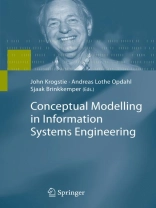Conceptual modeling has always been one of the cornerstones for information systems engineering as it describes the general knowledge of the system in the so-called conceptual schema.
Krogstie, Opdahl and Brinkkemper compiled 20 contributions from renowned researchers covering all aspects of conceptual modeling on the occasion of Arne Sølvberg’s 67th birthday. Many friends of this information systems modeling pioneer happily contributed their latest research results from fields like data modeling, goal-oriented modeling, agent-oriented modeling, and process-oriented modeling. Overall, the contributions reflect the most important developments and application areas of conceptual modeling in recent years, and they also pinpoint trends in conceptual modeling for the next decade.
This wide selection corresponds to the broad spectrum of Arne’s activities and long-term responsibilities with the VLDB Endowment, IFIP, and ERCIM. Arne was presented with this book at CAi SE 2007, when the event which he cofounded in 1989 returned to his hometown of Trondheim.
Innehållsförteckning
From Information Algebra to Enterprise Modelling and Ontologies — a Historical Perspective on Modelling for Information Systems.- Fact-Oriented Modeling: Past, Present and Future.- Data Integration — Problems, Approaches, and Perspectives.- Challenges to Conceptual Modelling.- Interoperable Management of Conceptual Models.- Uniform and Flexible Data Management in Workflow Management Systems.- Using Models in Enterprise Systems Projects.- The Role of Business Models in Enterprise Modelling.- Capturing System Intentionality with Maps.- Conceptual Modeling and Software Design of Multi-agent Systems.- Agent Approach to Online Legal Trade.- Methods and Tools for Developing Interactive Information Systems.- Conceptual Alignment of Software Production Methods.- The Co-Development of System Requirements and Functional Architecture.- Capturing Dependability Threats in Conceptual Modelling.- What Is Being Iterated? Reflections on Iteration in Information System Engineering Processes.- Systems Development in a GRIDs Environment.- Adaptive Information Systems.- Modelling of the People, by the People, for the People.- A Research Agenda for Conceptual Schema-Centric Development.
Om författaren
John Krogstie is Professor in Information Systems at NTNU, Trondheim, Norway. He is also a senior advisor at SINTEF and was employed as a manager in Accenture 1991-2000. John Krogstie is the Norwegian Representative for IFIP TC8 and vice-chair of IFIP WG 8.1 on information systems design and evaluation, where he is the initiator and leader of the task group for Mobile Information Systems.
Andreas Lothe Opdahl is Professor of Information Science at the University of Bergen, Norway. His research interests include information systems and enterprise modelling, requirements determination and enterprise information architecture. He is a member of IFIP WG8.1 on information systems design and evaluation.
Sjaak Brinkkemper is Professor of Organization and Information at the Institute of Information and Computing Sciences of the Utrecht University, the Netherlands. He leads a group of about twenty researchers specialized in product software enterpreneurship. The main research themes of the group are methodology of product software development, implementation and adoption, and business-economic aspects of the product software industry. He is a member of IFIP Working Group 8.1 on the ’Design and Evaluation of Information Systems’, of the ACM, of the Computer Society of the IEEE, and of the Netherlands Society for Informatics.












